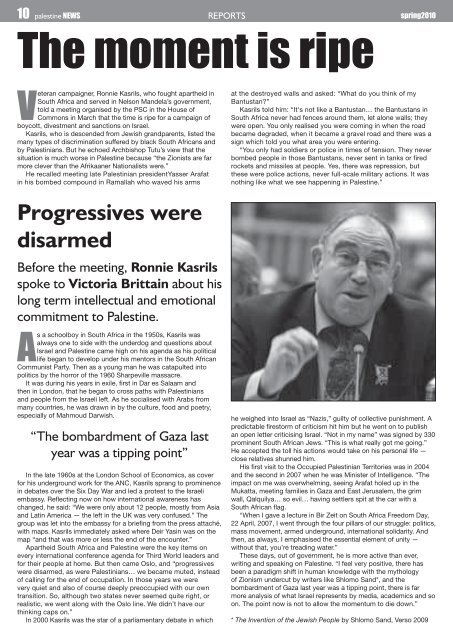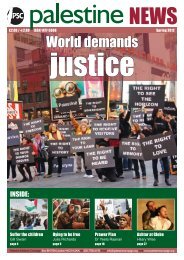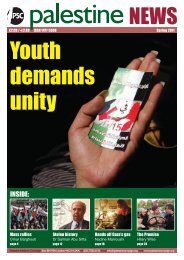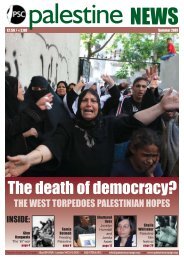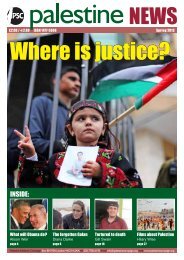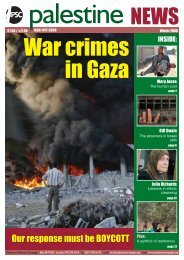INSIDE: - Palestine Solidarity Campaign
INSIDE: - Palestine Solidarity Campaign
INSIDE: - Palestine Solidarity Campaign
Create successful ePaper yourself
Turn your PDF publications into a flip-book with our unique Google optimized e-Paper software.
10 palestine NEWS REPORTS<br />
spring2010<br />
The moment is ripe<br />
Veteran campaigner, Ronnie Kasrils, who fought apartheid in<br />
South Africa and served in Nelson Mandela’s government,<br />
told a meeting organised by the PSC in the House of<br />
Commons in March that the time is ripe for a campaign of<br />
boycott, divestment and sanctions on Israel.<br />
Kasrils, who is descended from Jewish grandparents, listed the<br />
many types of discrimination suffered by black South Africans and<br />
by Palestinians. But he echoed Archbishop Tutu’s view that the<br />
situation is much worse in <strong>Palestine</strong> because “the Zionists are far<br />
more clever than the Afrikaaner Nationalists were.”<br />
He recalled meeting late Palestinian presidentYasser Arafat<br />
in his bombed compound in Ramallah who waved his arms<br />
at the destroyed walls and asked: “What do you think of my<br />
Bantustan?”<br />
Kasrils told him: “It's not like a Bantustan… the Bantustans in<br />
South Africa never had fences around them, let alone walls; they<br />
were open. You only realised you were coming in when the road<br />
became degraded, when it became a gravel road and there was a<br />
sign which told you what area you were entering.<br />
“You only had soldiers or police in times of tension. They never<br />
bombed people in those Bantustans, never sent in tanks or fired<br />
rockets and missiles at people. Yes, there was repression, but<br />
these were police actions, never full-scale military actions. It was<br />
nothing like what we see happening in <strong>Palestine</strong>.”<br />
Progressives were<br />
disarmed<br />
Before the meeting, Ronnie Kasrils<br />
spoke to Victoria Brittain about his<br />
long term intellectual and emotional<br />
commitment to <strong>Palestine</strong>.<br />
As a schoolboy in South Africa in the 1950s, Kasrils was<br />
always one to side with the underdog and questions about<br />
Israel and <strong>Palestine</strong> came high on his agenda as his political<br />
life began to develop under his mentors in the South African<br />
Communist Party. Then as a young man he was catapulted into<br />
politics by the horror of the 1960 Sharpeville massacre.<br />
It was during his years in exile, first in Dar es Salaam and<br />
then in London, that he began to cross paths with Palestinians<br />
and people from the Israeli left. As he socialised with Arabs from<br />
many countries, he was drawn in by the culture, food and poetry,<br />
especially of Mahmoud Darwish.<br />
“The bombardment of Gaza last<br />
year was a tipping point”<br />
In the late 1960s at the London School of Economics, as cover<br />
for his underground work for the ANC, Kasrils sprang to prominence<br />
in debates over the Six Day War and led a protest to the Israeli<br />
embassy. Reflecting now on how international awareness has<br />
changed, he said: “We were only about 12 people, mostly from Asia<br />
and Latin America — the left in the UK was very confused.” The<br />
group was let into the embassy for a briefing from the press attaché,<br />
with maps. Kasrils immediately asked where Deir Yasin was on the<br />
map “and that was more or less the end of the encounter.”<br />
Apartheid South Africa and <strong>Palestine</strong> were the key items on<br />
every international conference agenda for Third World leaders and<br />
for their people at home. But then came Oslo, and “progressives<br />
were disarmed, as were Palestinians… we became muted, instead<br />
of calling for the end of occupation. In those years we were<br />
very quiet and also of course deeply preoccupied with our own<br />
transition. So, although two states never seemed quite right, or<br />
realistic, we went along with the Oslo line. We didn’t have our<br />
thinking caps on.”<br />
In 2000 Kasrils was the star of a parliamentary debate in which<br />
he weighed into Israel as “Nazis,” guilty of collective punishment. A<br />
predictable firestorm of criticism hit him but he went on to publish<br />
an open letter criticising Israel. “Not in my name” was signed by 330<br />
prominent South African Jews. “This is what really got me going.”<br />
He accepted the toll his actions would take on his personal life —<br />
close relatives shunned him.<br />
His first visit to the Occupied Palestinian Territories was in 2004<br />
and the second in 2007 when he was Minister of Intelligence. “The<br />
impact on me was overwhelming, seeing Arafat holed up in the<br />
Mukatta, meeting families in Gaza and East Jerusalem, the grim<br />
wall, Qalquilya… so evil… having settlers spit at the car with a<br />
South African flag.<br />
“When I gave a lecture in Bir Zeit on South Africa Freedom Day,<br />
22 April, 2007, I went through the four pillars of our struggle: politics,<br />
mass movement, armed underground, international solidarity. And<br />
then, as always, I emphasised the essential element of unity —<br />
without that, you’re treading water.”<br />
These days, out of government, he is more active than ever,<br />
writing and speaking on <strong>Palestine</strong>. “I feel very positive, there has<br />
been a paradigm shift in human knowledge with the mythology<br />
of Zionism undercut by writers like Shlomo Sand*, and the<br />
bombardment of Gaza last year was a tipping point, there is far<br />
more analysis of what Israel represents by media, academics and so<br />
on. The point now is not to allow the momentum to die down.”<br />
* The Invention of the Jewish People by Shlomo Sand, Verso 2009


